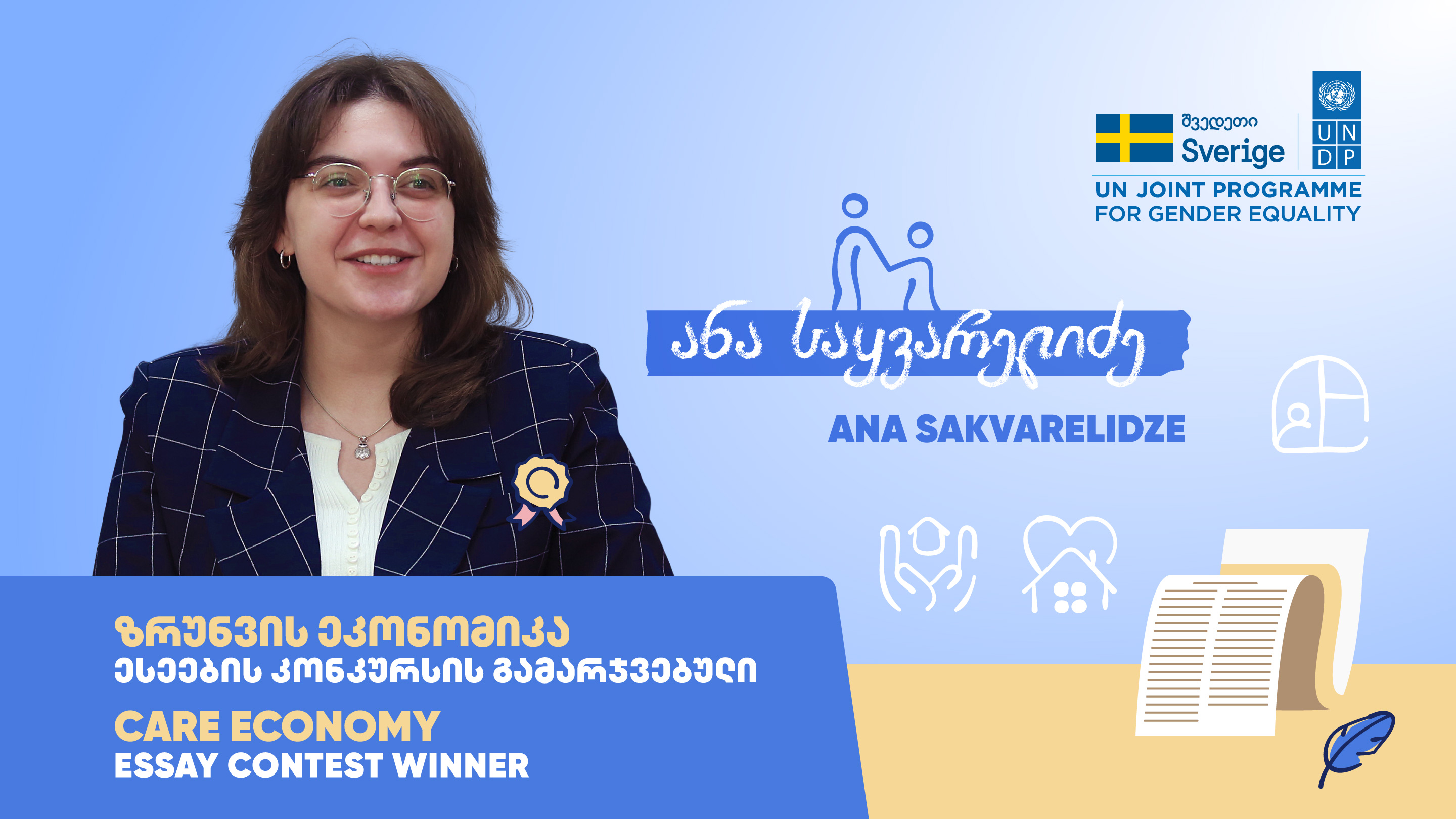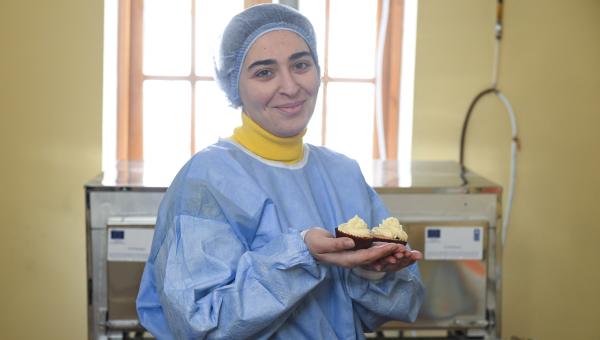UNDP and Sweden Support Students' Essay Contest on Care Economy
Care Economy - New Opportunity for Georgia and the World
November 8, 2023

Ana Sakvarelidze, Caucasian University. Winner of the UNDP and Sweden Essay Contest on Care Economy
See more blogs on the same topic:
- Can Unpaid Work Drive Economy? by Megi Surmanidze, Batumi Shota Rustaveli State University
Insight into Care Economy, by Lika Ablotia, Tbilisi State University
Abstract
In an ever-evolving world, the Care Economy has emerged as a beacon of hope, a testament to the invaluable role played by caregivers in upholding societies and nurturing the human spirit. This article embarks on a transformative journey through the Care Economy in Georgia and the world, illuminating its present landscape, unveiling thought-provoking statistical analyses, and crafting practical recommendations. Through an eclectic blend of scholarly research and real-world narratives, this article aims to deliver nothing short of extraordinary insights into the Care Economy, inspiring innovative solutions that ignite societal change.
The Care Economy: An Epiphany of Compassion
Within the tapestry of our global community, the Care Economy stands as a vibrant testament to the power of empathy and selflessness. Its recognition as a pivotal force in sustaining societies and promoting well-being is the clarion call for a paradigm shift, urging us to acknowledge the profound contributions of caregivers at the forefront of this movement.
The Covid-19 pandemic has highlighted existing social inequalities and the importance of universal care. As more people work from home, there is a growing need for creative solutions to address the challenges of caring for oneself, children, and elderly relatives. One potential solution that can make a real difference is embracing the concept of a Care Economy. A Care Economy prioritizes work that centres on providing paid and unpaid care services for individuals and communities while valuing human welfare together with ecological sustainability. According to supporters of this approach, a Care Economy offers opportunities to pursue economic justice within healthy ecosystems by reprioritizing what matters in society.
With an estimated two-thirds of the world's unpaid care work being performed by women, a Care Economy also has the potential to address gender inequalities and provide more opportunities for women's economic empowerment (Ons.gov.uk, 2016).
Illuminating Georgia's Care Economy Tapestry
In the picturesque landscapes of Georgia, a compelling narrative of care unfolds. Statistics from Georgia’s Time reveal a poignant truth: women in Georgia spend almost five times more on unpaid domestic and care work compared to men. The data also revealed the drastic difference between the time spent on the domestic and care work. Mothers, on average, spend 20.4 hours on childcare per week, compared to 3.9 hours spent by fathers (UN Women – Georgia, 2020). Such disparities, echoed across the country, demand our unwavering commitment to rebalance the scales of responsibility.
Due to household responsibilities, women more often work part-time than men. Findings from Georgia's 2019 labour force survey offer compelling insights into the stark disparities between women and men when it comes to caregiving responsibilities. The data reveals that a significant 22% of women in Georgia cite housekeeping, childcare, and elderly care as reasons for their part-time employment. In stark contrast, a mere 1.4% of men report the same reasons for their part-time work arrangements.
Moreover, the survey highlights that a staggering 58% of women respondents attribute their inability to start work to the demands of childcare or elderly/disabled care. In contrast, only 5% of men share the same constraint. These figures underscore the disproportionate burden placed on women in Georgia, who face significant challenges when it comes to entering or maintaining full-time employment due to caregiving responsibilities.
Women are paid less since they are unable to engage in full-time or high-responsibility work. In Europe, the “raw” gender pay gap (unadjusted for education and other characteristics) is around 15%, while in Georgia the corresponding gap is 17.7% (ISET, 2021).
According to a captivating UN Women survey, the COVID-19 pandemic has imposed a heavier burden of unpaid care work on individuals of all genders, albeit with a more pronounced impact on women. The findings reveal that a larger percentage of women reported spending increased time on essential tasks such as cleaning (35% of women compared to 24% of men), cooking (31% of women compared to 25% of men), and caring for children (61% of women versus 44% of men). These eye-opening statistics emphasize the urgent need to address the unequal distribution of caregiving responsibilities and the impact of the pandemic on the Care Economy.
Harnessing the Economic Potential of Care Investment
Gender equality can be promoted by investing in the Care Economy. Governments can provide financial support to develop services that cater to the needs of the elderly and disabled, and they can implement policies that ensure that workers are paid, especially women workers are provided with a source of income and their economic status is improved. One way to promote gender equality is by implementing the policy of paid leave for care workers. It allows women to take time away from their jobs to look after their families.
Over and above that, there is a shortage of skilled nursing and care workers, as well as a high cost of services in rural areas and remote locations. To address these challenges, stakeholders and policymakers in Georgia need to collaborate to create a supportive framework that will allow the state to develop the Care Economy. This can be achieved through the establishment of incentives to encourage the growth of new services, training programs for care providers, and the implementation policies that promote access.
In addition, a new dawn awaits those who dare to invest in the care economy, for it holds the key to untold economic prosperity. The resounding triumphs of countries like Sweden and Canada stand as testaments to the transformative power of comprehensive care systems, propelling female labour force participation rates to new heights while forging a path to unparalleled gender equality. Sweden could be taken as an inspiring model: families receive generous subsidies for utilizing private childcare services.
Canada is making strides to tackle the issue at home by breaking down care-related barriers that hinder women's full workforce participation. A nationwide early learning and child-care system is being established to ensure equitable access to high-quality, affordable, and flexible care, regardless of location. Internationally, Canada is championing care-focused programs that empower women to thrive in the realms of economy, education, and public life. By addressing inequalities head-on, these initiatives foster women's inclusion and amplify their impact on the global stage. Furthermore, CARE Canada has implemented projects to address the gender imbalance in household responsibilities. These initiatives focus on enhancing the health and nutrition of women and girls in southern Africa and improving the economic well-being of ethnic-minority women in impoverished rural areas of northern Vietnam. The objectives of these projects include promoting men's involvement in caregiving roles and empowering women to have decision-making authority both within their households and in the wider public sphere (ReliefWeb, 2022). By establishing a similar system with public financing support, we can unlock the doors to economic independence for women and forge a brighter future where the care economy thrives, benefitting both individuals and society as a whole.
Pioneering Pathways: Recommendations for Georgia
To unlock the full potential of the care economy, we must tread upon bold and purposeful pathways. Let us forge ahead, guided by these precise and practical recommendations:
a. Enriching Lives through Accessible and Exemplary Childcare: Expanding access to affordable, high-quality childcare empowers parents, particularly women, to embrace their professional aspirations while ensuring their children receive the nurturing they deserve.
b. Embracing the Symphony of Work-Life Balance: Harmonizing the demands of work and caregiving is a symphony awaiting its crescendo. By championing flexible work arrangements and establishing comprehensive paid parental leave policies, we can orchestrate an empowering environment where individuals thrive in both their professional and personal realms.
c. Unveiling the Value of Care Work: The time has come to confer the recognition and reverence upon informal care work that it so richly deserves. Instituting mechanisms such as caregiver credits and social security benefits validates the profound economic and social significance of this vital labour of love.
d. Safeguarding Our Collective Future: Fortifying social protection systems by offering comprehensive healthcare, long-term care, and pension programs light the way towards a future where the burden of care is eased, ensuring the well-being of individuals and families.
Conclusion
In summation, the care economy is a vital part of promoting gender equality. Governments can help address the inequalities in this sector by investing in services and policies that support workers. This can be done through recognising the value of care work and by implementing measures that encourage families and individuals to receive the best possible care. With the right policies and investments, the care economy can become an important engine of growth and development in Georgia and beyond.
Bibliography:
- Folbre, N. (2018). Developing care: recent research on the care economy and economic development. Dspacedirect.org. [online] Available at: https://idl-bnc-idrc.dspacedirect.org/handle/10625/57142
- Journal of Human Development. (2023). Measuring Care: Gender, Empowerment, and the Care Economy. [online] Available at: https://www.tandfonline.com/doi/abs/10.1080/14649880600768512
- Civil.Ge (2022). Geostat: Women Spend 4.9 Times More Time on ‘Unpaid’ Domestic Work. [online] Civil Georgia. Available at: https://civil.ge/archives/518145
- A Georgian Woman’s Burden: How Pandemic Affected Distribution of Household Work between Men and Women, and Why It Matters (2021). [online] Available at: iset-pi.ge/en/blog/2937-a-georgian-womans-burden-how-pandemic-affected-distribution-of-household-work-between-men-and-women-and-why-it-matters.
- UN Women – Georgia. (2020). Rapid Gender Assessment of the COVID-19 Situation in Georgia. [online] Available at: https://georgia.unwomen.org/en/digital-library/publications/2020/08/rapid-gender-assessment-of-the-covid-19-situation-in-georgia
- Office for National Statistics (2016) “Women Shoulder the Responsibility of “Unpaid Work.” Ons.gov.uk [Online] Available at: www.ons.gov.uk/employmentandlabourmarket/peopleinwork/earningsandworkinghours/articles/womenshouldertheresponsibilityofunpaidwork/2016-11-10#:~:text=Women%20carry%20out%20an%20overall,to%20cooking%2C%20childcare%20and%20housework
- UN Women – Georgia. (2020). Time Use Survey in Georgia: 2020-2021. [online] Available at: https://georgia.unwomen.org/en/digital-library/publications/2022/12/time-use-survey-in-georgia-2020-2021
- European Commission - European Commission. (2023). Press corner. [online] Available at: https://ec.europa.eu/commission/presscorner/detail/en/ip_22_5169
- UN Women – Georgia. (2022). Unpaid Care Work in Georgia. [online] Available at: https://georgia.unwomen.org/sites/default/files/2022-09/Unpaid-Care-Work%20V2%20eng.pdf
- ReliefWeb. (2022). Changing the balance for women in the care economy - World. [online] Available at: https://reliefweb.int/report/world/changing-balance-women-care-economy
Students' essay contest on the care economy was supported by UNDP and Sweden as part of the Sweden-funded UN Joint Programme for Gender Equality. This landmark initiative assists Georgia in making social, economic and policy strides toward achieving meaningful gender equality for everyone, everywhere. The programme is implemented jointly by three UN agencies – UNDP, UNFPA and UN Women.
Explore more

 Locations
Locations




